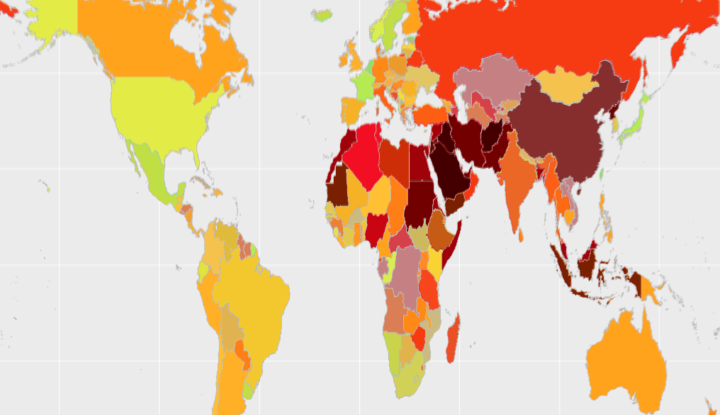The third annual Freedom of Thought Report has been released today by the International Humanist and Ethical Union (IHEU) which shows that non-religious people are being targeted by “hate campaigns” in countries around the world, as a distinct minority group. Leaders from Humanist Associations in the Netherlands, Norway, Belgium, the UK, and the US have issued the following statement;
Religious fundamentalism has reared its ugliest head in the past year. Islamic State and Boko Haram have threatened everyone they regard as ‘apostates’ or ‘unbelievers’. Although the most extreme, these terrorist organisations are not alone. In its annual global ‘Freedom of Thought’ report, the International humanist and Ethical Union (IHEU) has shown how many recognised governments are guilty of the persecution and torture of the non-religious. In no fewer than thirteen countries, the non-religious risk the death penalty.
At just over 16% the non-religious represent the third largest global group after Christians and Muslims. In Europe the non-religious form the majority in many countries. In the United States, a third of the citizens under 30 are non-religious. Even in these countries the rights of non-believers are often undermined by law or social and religious pressure. In some parts of the United States you can easily lose your job if you are openly an atheist.
This calls for international attention by non-religious and religious voices alike. After all, when freedom of thought is threatened, every minority suffers. In Sudan, Meriam Ibrahim was sentenced to death for ‘apostasy’ for converting from Islam to Christianity, and only after international pressure was able to flee the country. Asia Bibi, a Pakistani Christian woman, still awaits the same fate: an appeal against her death sentence was rejected in October. In the extremist ideology of Islamic State even moderate Muslims find themselves targeted as ‘apostates’. In the eyes of a fundamentalist, being different is being godless and makes you a legitimate target of violence.
These kinds of attacks on basic human rights also take place on the level of the United Nations. For years Russia and many African nations, as well as Islamic states, have argued for the curbing of the ‘defamation of religion’, aiming to squash any criticism of official religions. Thanks to counter-pressure from several Western countries and NGOs – among them humanist organsiations – this argument has been checked. But Russia, backed by conservative Christian and Islamic countries, now takes another angle on the subject and demands the protection of so called ‘cultural traditions’ and ‘traditional values’. Such reinterpretations of human rights are meant to eliminate and suppress unwelcome and dissenting views as ‘untraditional’ or ‘insulting’.
It is of the utmost importance to dismantle this Trojan horse, a process that is impeded by notorious human rights violators like Pakistan and Saudi Arabia on the UN Human Rights Council. They will be bolstered next year by Bangladesh, Nigeria, and Qatar and if the Human Rights Council is not to end up a complete farce, these countries must be stopped in their attempts to use the Council to strip down fundamental human rights.
We – as the international humanist movement – are taking a united stand across borders to draw public and political attention to the outright human rights violations perpetrated against the non-religious. The increasing demographic of atheists, humanists, and others not affiliated with any religious institution should no longer be ignored. By protecting our right to be non-religious, we are also taking a strong stance for religious diversity. Religious people, too, need the right to be ‘non-believers’ in the perception of the other. The fight for secular values is not a fight between religion and humanism, but between authoritarianism and individual freedom.
